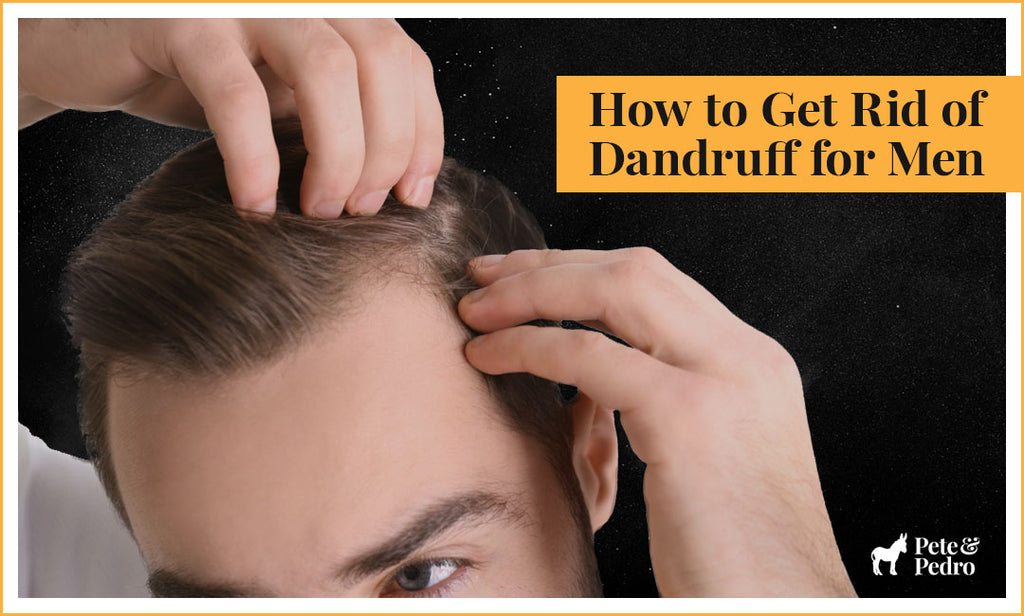How to Get Rid of Dandruff for Men
Given that dandruff affects as much as half of the adult population, there’s a pretty good chance you’ve had a run-in with the flaky stuff a time or two in your life. In most people, dandruff first pops up in puberty and then peaks in severity around age 20, lingering until we reach our 50s. And if you’re one of the many who are plagued by the flake, then you know that this condition is one of the most annoying there is. Having flakes snow all over your shoulders and clothes can affect your self-esteem in a big way, so it’s definitely something you want to fix before it starts to drag you down.
What Is Dandruff?
Understanding exactly what dandruff is and why it occurs is step number one in banishing the flakes from your life forever. Don’t feel like getting too scientific? Skip to the TLDR below.
Dandruff is actually a mild form of seborrheic dermatitis of the scalp, a condition that causes the skin to scale, flake and itch. It is generally triggered by an overgrowth of fungus in the scalp—specifically, a type of single-celled microbe called Malassezia yeast—which triggers an immune response on the skin and causes lingering discomfort. To get specific, this yeast feeds off your scalp’s natural oil (sebum) and then breaks it down into other components, including oleic acid. Gross, right?

Oleic acid is what causes the immune system to attack and want to shed the irritated skin. The tiny white and yellow skin flakes that the skin has shed are collectively called dandruff. While we mostly associate dandruff with the scalp, this reaction can actually happen all over the body, including on the eyebrows, the nose and the beard (side note: check out our guide to getting rid of beardruff if you’re plagued by facial flakes). As we’ll cover below, this overgrowth happens for a number of reasons that are preventable with much success, so don’t stress.
In addition to the actual flakes themselves, which can be super annoying and embarrassing, this reaction causes a ton of frustrating and uncomfortable side effects, including itchiness, dryness, redness and general irritation. Besides that, though, dandruff is relatively harmless. It’s not considered a serious condition, nor is it classified as an allergy or infection. In short, dandruff won’t harm your body or worsen your health in any serious ways. But the discomfort and embarrassment are definitely enough for most guys to want to get it under control.
TLDR: Dandruff is the white and yellow flaky stuff that falls off the skin. It’s caused by an overgrowth of yeast that feeds on your scalp’s natural oils and causes the skin to shed. It can be treated with the right dandruff control products.
Know What’s Triggering Your Dandruff
Why do we get dandruff? First off, let us say that dandruff is super common. Like, so common that as many as 50 million adults have it. Let us also say that having dandruff does not mean you’re dirty or have bad hygiene, either. The thing is, some of us are just more likely to have a strong allergic reaction to the yeast and the oleic acid that it produces. It doesn’t make you gross, it just makes your body a bit more sensitive. With that being said, there are a few things that could be triggering or worsening the condition, and knowing the problem is the first step to knowing how to get rid of dandruff once and for all.
- Not Washing Your Hair Enough—How often you need to wash your hair comes down to the natural chemistry of your body, your hair type and a few other factors. Dandruff may be one indicator that you’re not washing it enough. When you’re not washing your hair frequently enough, the scalp becomes extra oily and way more hospitable to yeast. The more oil on your scalp, the better fed the yeast and the more flakes occur. You want to keep your scalp well-moisturized but not oily.
- Cold, Dry Weather—Cold, dry weather likely isn’t to blame for an overflow of flakes, but it can definitely worsen existing dandruff. The fact is that cold weather causes dry skin all over the body—including on your scalp—and dry skin lacks the structure it needs to stay healthy and strong. One good way to ensure that scalp dryness doesn’t heighten your dandruff in the winter is to sleep with a humidifier running to prevent your skin from drying out. You’ll also want to use a deeply hydrating shampoo that locks in moisture.

- Warm, Wet Weather—We know, we know. Is there any weather that won’t cause dandruff? Besides a mild, not-too-dry fall and a mild, not-too-wet spring, probably not. Here’s the thing: Yeast loves warm, wet environments and, unfortunately, that means your scalp, beard and brows in the summertime. The weather itself won’t cause dandruff, but the sweat and heat can most definitely aggravate it and create a great spot for that Malassezia yeast to thrive.
- Another Health Condition—Dandruff can most definitely occur on its own due to an imbalance or natural chemical reaction on the skin. However, there is a chance it may be related to an underlying health condition that you may want to rule out. You have a heightened risk factor of developing seborrheic dermatitis if you suffer from other skin conditions, including acne, rosacea and psoriasis, as well as HIV, epilepsy and Parkinson’s disease. Interestingly, dandruff has also been linked to higher levels of stress (so, yeah, that beach vacation you’re planning could count as a dandruff treatment if you really want it to).
- Using the Wrong Products—People who have seborrheic dermatitis are much more likely to experience skin irritation when the wrong products are used. Sometimes, the ingredients in your shampoo or conditioner can actually worsen irritation and dryness because they cause an allergic reaction on your scalp. When you’re first exploring the cause of your dandruff, it’s important to consider all the products you use and do some elimination to see if your products may be to blame.

The Best Ways to Get Rid of Dandruff
Ok gents, not that we've got that covered, here's how to get rid of dandruff. There are a number of treatment options out there for guys who tend to see excessive flakes, all of which aim to banish the dandruff-causing yeast itself or the oils on which it thrives. Other dandruff treatment options are designed to soothe the scalp and the dry, itchy skin that usually comes along with it. Many people have better success when using a combination of treatment options at once, so don’t be afraid to mix and match.
- Use an Anti-Dandruff Shampoo—Anti-dandruff shampoo is the best way to get rid of dandruff, hands down. We always recommend using tea tree shampoo for dandruff and washing the hair once a day for the best results. Tea tree oil has antifungal properties, which means it will help slow yeast overgrowth. Some studies even show that tea tree oil is effective at knocking out the specific type of yeast that causes dandruff. Our anti-dandruff formula also contains coal tar—which actually helps slow the growth of skin cells to decrease scaling and dryness—as well as a bit of menthol to soothe irritated skin and get rid of itchiness.
- Alternate with a Hydrating Shampoo—If you generally suffer from dry skin and dandruff, we recommend alternating with a hydrating shampoo in between uses of your anti-dandruff products. You simply can’t risk worsening your irritated scalp with dryness, itchiness or flakiness that could triple dandruff production.
- Stimulate the Scalp—Giving yourself a deep scalp massage or using a scalp massaging shampoo brush may be one of the best activities to add to your anti-dandruff routine. A little bit of scalp stimulation can do wonders for the overall health of the scalp, aiding in the removal of dead skin cells and providing relief for those struggling with extreme itch. When you use a scalp brush to work the shampoo into your hair, you also get a deeper clean, which can help rid the scalp of all the oils and bacteria that yeast love. Plus, when you’ve got an itchy head, it feels amazing to give it a little scratch while you’re washing.
- Use Soothing Hair Products—Along with dandruff usually comes dryness, itchiness and irritation, but a few soothing hair and scalp products can do wonders for calming the discomfort. For example, using products containing aloe vera or menthol can help ease itch and pain so you scratch (and flake) less. Make sure you choose shampoo and conditioner containing nourishing ingredients. If you’ve got an extreme case of itchy scalp, you may find some relief by soaking your head in a warm bath spiked with some baking soda and other soothing extras.
- Eat More Good Bacteria—The ladies have been using this trick forever to get rid of yeast infections, so let’s take a page from their book. Good bacteria (probiotics) found in fermented foods like yogurt, kimchi, kombucha, sauerkraut and beer (especially those super-strong ones from the microbrewery) work in opposition to the yeast and bad bacteria that cause scalp discomfort and dandruff. The idea is to create a good bacterial balance and not let the bad stuff overtake the good. And if it means chugging an extra pint every night, it’s definitely worth a shot.
- Eat More Omega-3 Fatty Acids—Omega-3s are the fatty acids found in fish, seeds, nuts and oils that are good for your health in a ton of ways. One of the ways they can help you with dandruff is by banishing dry skin and inflammation–two conditions that are closely linked to dandruff. Packing your diet with mighty, little omegas can help lock in hydration and moisture, especially in the winter when your dry scalp is worsening the flakage.
- Use Non-Flaky Products—This one’s a little obvious, but it’s good to have the occasional reminder if you’re going through all the ways to improve your scalp health situation. Make sure you’re not using any hair products that could dry and flake throughout the day. Of course, this won’t actually worsen your condition, but it will heighten the appearance of dandruff and make it look like you have a really severe case when the snow piles up on your shoulders. Use only high-quality men's hair products even if you don’t suffer from dandruff.

- Go on Vacation—OK, we’re only semi-serious here, but if it’s the push you need to finally book that tropical cruise, we’re here for it. In actuality, a little leisure time may do wonders for the health of your skin and scalp. On top of that, the Mayo Clinic says sunlight may be good for dandruff. Just make sure you slather on the SPF because, as we all know, sunburn is only going to worsen all of your skin woes. Plus, as we already mentioned, stress may be related to your dandruff, so a good old week-long veg-out may be the thing you need to temper the flakes.

Finding What Works for You
The thing about dandruff is that it’s different from one case to the next, and not all sufferers will get the exact same results when they use the same treatments. But, thanks to all the amazing hair care products out there, you should be able to find yourself dandruff-free with a little patience and experimentation. If you’ve found a great way to exile this annoying condition for good, please let us know how in the comments!
You Might Also Want To Check Out:
How To Get Rid Of Beard Dandruff
How To Get Rid Of Yellow Nails
← Older Post Newer Post →




